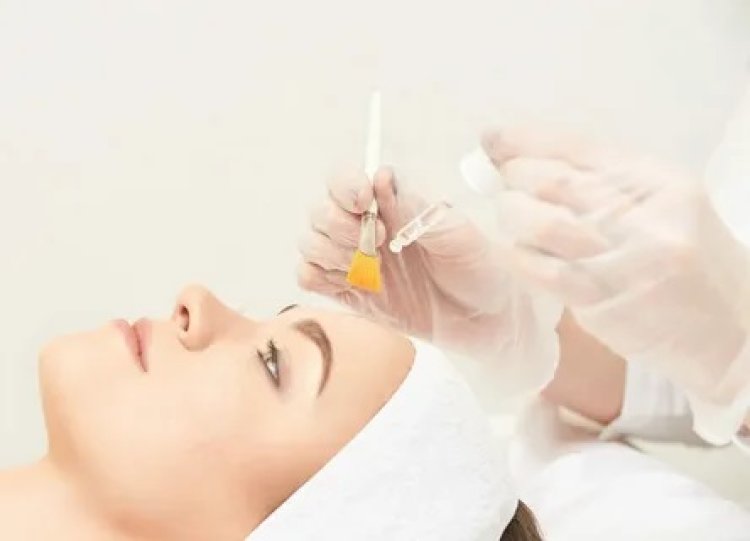Summer Skin Rescue: Are Chemical Peels Safe During Dubai's Hot Months?
Discover the benefits of chemical peels in Dubai for skin rejuvenation. Learn about different types, what to expect, target concerns like acne and aging, and how to find the best clinics for a radiant Dubai glow.
Share this Post to earn Money ( Upto ₹100 per 1000 Views )

In a city like Dubai, where the sun blazes nearly all year round, especially during the summer months, many residents wonder: Are chemical peels safe during the hottest time of the year? If you're considering a chemical peel in Dubai(التقشير الكيميائي في دبي)during summer, you're not alone. While the idea of exfoliating your skin when temperatures soar might seem risky, the truth lies in the preparation, aftercare, and choosing the right peel type.
Let’s break down what makes chemical peels safe—or not—during Dubai’s intense heat and how you can make informed decisions for your summer skincare goals.
Understanding Chemical Peels
A chemical peel is a cosmetic procedure that involves applying a solution—typically containing alpha-hydroxy acids (AHAs), beta-hydroxy acids (BHAs), or stronger agents like trichloroacetic acid (TCA)—to remove dead skin cells and promote regeneration. It addresses a variety of skin concerns, including:
-
Uneven skin tone
-
Acne and acne scars
-
Fine lines and wrinkles
-
Sunspots and pigmentation
-
Dull, congested skin
Chemical peels are categorized into:
-
Superficial peels – Mild exfoliation (ideal for summer)
-
Medium peels – Penetrate deeper into the dermis
-
Deep peels – More intensive and typically done in cooler months due to longer recovery
Challenges of Summer in Dubai for Skin
Dubai summers are no joke. Temperatures often exceed 40°C (104°F), UV index levels are extreme, and air conditioning leads to dehydration. These conditions pose two main risks after a peel:
-
Sun Sensitivity – Post-peel skin is more photosensitive, and unprotected exposure can lead to burns, hyperpigmentation, or scarring.
-
Dehydration – Both from the environment and the procedure, skin can become flaky, irritated, or inflamed if not properly cared for.
So, does this mean chemical peels are off-limits during summer? Not necessarily.
Safe Peel Options for Summer
1. Superficial Peels
These are generally safe for summer use as they target the epidermis and involve minimal downtime. Popular choices include:
-
Glycolic acid peels – Boost radiance, reduce fine lines
-
Salicylic acid peels – Great for acne and oily skin
-
Lactic acid peels – Hydrating and gentle for sensitive skin
These peels don’t cause extensive peeling or leave the skin raw, making them suitable with proper sun protection.
2. Enzyme Peels
Derived from fruits like papaya or pineapple, enzyme peels are incredibly gentle and are perfect for maintaining glow without increasing sun sensitivity.
3. Customized Low-Strength TCA Peels
When done under medical supervision and in controlled concentrations, TCA peels can also be considered, though many practitioners prefer to delay medium-depth treatments until cooler seasons.
Expert Advice: When to Avoid Peels in Summer
While superficial peels are generally safe, you should reconsider or postpone peels if:
-
You have upcoming prolonged sun exposure (e.g., beach vacations)
-
Your skin is sunburnt or compromised
-
You’re undergoing intense outdoor physical activity
In these cases, delaying your treatment can prevent complications like post-inflammatory hyperpigmentation (PIH).
Prepping Your Skin for a Summer Peel
To ensure safety and maximize results, proper prep is essential:
-
Avoid sun exposure for at least one week prior.
-
Discontinue retinoids or harsh exfoliants 3–5 days before the peel.
-
Stay hydrated – internally (drink water) and externally (use hydrating serums).
-
Consult a dermatologist to determine the right type of peel for your skin and the season.
Post-Peel Care in the Dubai Heat
Here’s how to care for your skin after a chemical peel during summer:
-
Sun Protection Is Non-Negotiable
-
Use a broad-spectrum SPF 50+, reapply every 2–3 hours.
-
Wear a wide-brimmed hat or umbrella when outside.
-
Limit sun exposure, especially during peak UV hours (10 AM–4 PM).
-
-
Gentle Skincare Only
-
Use a mild, sulfate-free cleanser.
-
Skip active ingredients (retinol, AHAs, vitamin C) until your skin has fully healed.
-
Apply healing balms or moisturizers containing hyaluronic acid, panthenol, or ceramides.
-
-
Avoid Excess Heat
-
No saunas, hot yoga, or steam rooms for at least a week.
-
Let your skin breathe and avoid sweating as much as possible in the first 48 hours.
-
-
Don’t Pick or Peel
-
Let dead skin slough off naturally. Premature peeling can damage new skin and increase scarring risks.
-
Are There Benefits to Peeling in Summer?
Yes! If done wisely, a chemical peel in Dubai during summer can:
-
Help manage acne flare-ups due to sweat and oil buildup
-
Refresh your skin after heat-induced dullness
-
Improve product penetration, making your summer skincare more effective
Just be sure to choose gentler options and prioritize aftercare.
Final Thoughts
Chemical peels can absolutely be done during Dubai’s hot summer months—but with caution. Superficial peels and enzyme treatments are safe and effective options when combined with vigilant sun protection and expert supervision.
If you’re unsure whether to go for a chemical peel in Dubai this summer, speak with a licensed dermatologist or skin clinic. They’ll assess your skin condition, lifestyle, and treatment history to recommend the safest and most effective plan for you.













